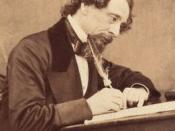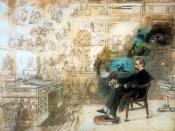The novels, 'Hard Times' and 'Love on the Dole,' are built around a symbolic character foundation and both authors' use and portrayal of character is, therefore, an integral part to an understanding of both novels. 'Hard Times' and 'Love on the Dole' are both examples of the nation and how it was being affected by various changes at the time. Consequently, character forms the basis intended to provide a clear picture of society. However, it is the way that the authors' present these characters, in order to demonstrate the sullen socialism and utilitarian attitudes in 'Hard Times' or the exploitation of the economic system in 'Love on the Dole.'
The way Dickens presents character in 'Hard Times' is a fundamental aspect in dealing with the major concerns of the novel. Dickens has a surprisingly complex character foundation; he deliberately presents both the simplistic characteristics of a character developed for symbolic purposes, as well as the intricate qualities of real people.
Dickens gives us a close-up look into what appears to be the ivory tower of the bourgeoisie of his day. There are three main characters in 'Hard Times' that display realistic qualities, moreover representing three different socio-economic positions; from lower class to upper class. Therefore, it is essential to witness the characters of 'Hard Times' as more than just caricatures for an allegorical novel; it is important that they are real, thinking, breathing, and feeling people, who are driven by impulse, desire and acceptance.
In contrast, in 'Love on the Dole' Greenwood delves into the sub-conscious minds of his characters using techniques such as stream of consciousness; stream of consciousness that is present throughout the novel, as the reader appears to grow up with Harry or through the presentation of Larry as an outsider. Early in the novel, when the...


